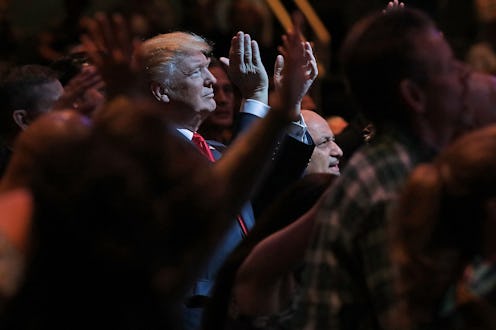News
Why This Org Says Trump's Evangelical Advisory Board Is Straight-Up Breaking The Law

A major part of President Trump's supporter base is the evangelical Christian community, which is why it came as no surprise when his presidential campaign announced it would be putting together a faith advisory committee. Now, an advocacy group claims that Trump's evangelical advisory board is breaking the law, and demands that it stop meeting until it provides transparency about its activities, reports The Washington Post.
Americans United for Separation of Church and State filed a letter on Thursday saying that the board's meetings are unlawfully shrouded from public view, and violate the Federal Advisory Committee Act (FACA). FACA was established in 1972 to codify guidelines around outside groups giving advice or recommendations to the president. It requires that advisory groups "be chartered, that their meetings be announced in advance and open to the public, and that their work product be made available to the public."
According to Americans United, the evangelical advisory board has not complied with any of the FACA requirements, "yet its members have boasted about the important work they’re doing with the president and their access to him and other administration officials." In addition to requesting that the advisory board "cease meeting and providing advice to the President" until it complies with FACA, Americans United also submitted Freedom of Information Act requests to determine how much interaction the board has had with federal agencies.
In its letter, Americans United claims that the board has advised the White House on policy issues like taxes, religious liberties, health care, and judicial appointments. However, the board itself seems to think it isn't really a formal group. "The truth is, there actually isn’t a board," Johnnie Moore, the spokesman of the evangelical advisory board, told The Post. "This is slang language that has carried over from the campaign into the administration. There is no formal faith advisory board of any sort at the White House." Moore also said that meeting agendas could be obtained through the Office of Public Liaison, and that the group had not voted on any recommendations or decision.
From the start of his presidency, Trump has consistently delivered on policies in the evangelical Christian agenda. Last December he formally recognized Jerusalem as the capital of Israel and following Hurricane Harvey he designated a "prayer Sunday." The administration also established a Conscience and Religious Freedom Division of the Department of Health and Human Services in January. And with the appointments of Neil Gorsuch and Brett Kavanaugh, Trump has twice delivered on a campaign promise to nominate only anti-abortion SCOTUS judges.
Even with such an effective advocate, prominent evangelical Christians seem to view their relationship with Trump as a means to an end. "He wanted that [evangelical] voting bloc. He wanted their votes," Rev. A.R. Bernard, a former member of the advisory board told The New York Times. "It was transactional. He wanted to do whatever he thought would get those votes."
Following reports that Trump had paid hush money to cover up an alleged affair with a pornographic actress, Robert Jeffress, a current member of the board, told The Times, "Evangelical support for President Trump has always been based on his policies, not on his personal piety."
The relatively closed-door, single-faith approach of Trump's advisory cancel is in contrast to his predecessors' faith-based councils, which included voices from multiple backgrounds and religions.
"The public is right to expect visibility into a White House’s engagement with individuals and organizations," Melissa Rogers, former chair of the Obama council told The Post. "Citizens should be able to access information and make their own evaluations about whether their interests are being well-served."